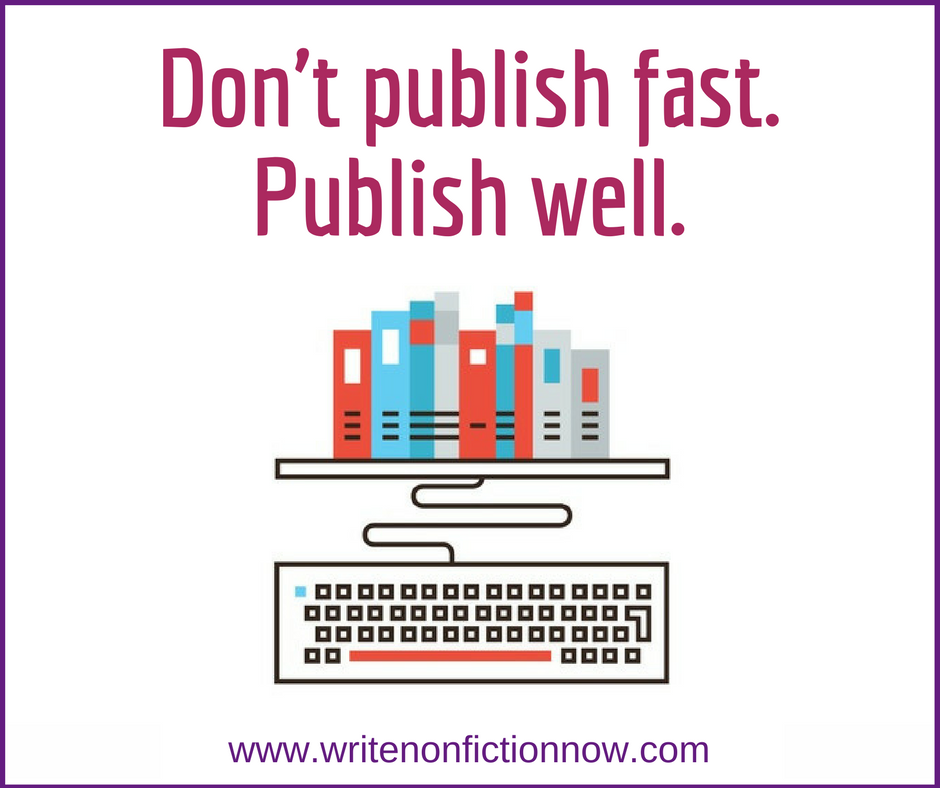 I believe there is a misconception about writing and publishing a book. Many aspiring authors hear that it’s easy to become an author. Not only that, they’ve been told they can write and publish a book quickly—sometimes in a weekend. For the majority of people, that’s simply not true…not if you want to publish a marketable, high-quality book.
I believe there is a misconception about writing and publishing a book. Many aspiring authors hear that it’s easy to become an author. Not only that, they’ve been told they can write and publish a book quickly—sometimes in a weekend. For the majority of people, that’s simply not true…not if you want to publish a marketable, high-quality book.
More than once in my career as an Author and Book Coach I’ve had writers come to me stressed out, overwhelmed, frustrated, and literally in tears because they took a book-in-a-month or book-in-a-weekend course but didn’t finish the book or publish it in that period. They thought something was wrong with them. In fact, there’s something wrong with what they had learned about writing and publishing a book.
In many cases, you can write a book in a month and a short book in a weekend. But typically you won’t be ready to publish it that fast.
Concept Development is One Thing, Publishing a Book is Another
One time a writer hired me to help her finish an ebook. She had taken a book-in-a-weekend course. The person who ran the program had helped her place the book on Amazon for pre-sale…and it already had achieved bestseller status in a category.
But the book was not written. It wasn’t even close to done. And my client had just four weeks to get the book written, edited, formatted, and proofread before the release date indicated on Amazon. She wanted me to help her accomplish that goal.
I told her there was no way.
The ebook she had planned was not a short one. Even for a seasoned writer like myself, I projected it would take at least a few weeks to write.
She didn’t consider herself a writer; she was more of a speaker, which meant writing would be a slower process for her. I devised a way for her to get her ideas on paper, but I also told her that, even if she could get the book written in the next week or two, she couldn’t release it on time.
Why?
I couldn’t locate any editors on short notice who had time to edit the book—and every book needs editing. My proofreader was on vacation, so, even if an editor finished the job in a week, we’d have to find a new proofreader who had time to do the work fast. And my client would then still need a designer to design and format the book for Kindle, or she’d have to do it herself using a book-design template.
With the current book concept, I estimated it would take her a good six weeks, if not more, to complete it in a manner that produced a quality project. (In the end, she wrote a shorter book. She finished on time…but not without a lot of stress.)
So, what did this aspiring author need to know before she started her project? She needed to understand the writing and publishing process. Specifically, she needed to understand three essential things about writing and publishing a book.
You need to know them, too.
Publishing Essential #1: Ability
Many people think they must be good writers or have writing talent to write a book. They must be writers. Not true.
Book editors and book doctors exist to help non-writers, as well as writers, produce publishable manuscripts. An author coach also can help you get your book written. (As I mentioned, I gave the speaker mentioned above a way to write her book based on her ability to provide oral presentations.) While enormously expensive, you also can hire a ghost writer if you can’t or don’t want to compose your manuscript.
But keep this in mind: A non-writer will need more time to complete a manuscript. If that’s you, plan extra time…double or triple the time…required for a writer to produce the same number of words.
Indeed, if you are a writer, you can write a book more quickly and efficiently. And your manuscript will need less editing than one produced by a non-writer.
Publishing Essential #2. Process
Publishing a book takes more than writing. You don’t just sit down and write and end up with a published book. It’s a process—one many aspiring authors don’t understand.
When you hear about or participate in a book-in-a-month or book-in-a-weekend program, you don’t complete that period with a finished product. For example, during National Nonfiction Writing Month or National Novel Writing Month you only write. Once the event is over—after 30 days or your weekend, you have a rough draft of your manuscript. That’s all. There’s lots more for you to do before you are ready to publish.
Here are the steps you must take to write and publish a book:
- Concept development—This includes market analysis; competitive analysis; creating a book pitch; listing reader benefits or takeaways; writing a mission statement; and developing a table of contents, detailed outline, and chapter summaries.
- Writing—This is the time spent composing your manuscript. You also may include the time spent on revisions before moving on to editing.
- Editing—Once you have finished the manuscript, you need to employ editors. You likely need a developmental editor and then what is called a line or copy editor. The first type of editor evaluates how well you have carried out your concept and looks for omissions, redundancies, misplaced content, and anything that doesn’t make sense or leaves a question in the reader’s mind. Your work might need just one round of developmental editing, but most books go through two or three rounds, which can take many months. The second type of editor cleans up your writing; line editing involves strengthening each one of your sentences and checking for grammatical and punctuation mistakes. Line or copy editing is painstaking work; this phase might take an editor a week or a month depending on the length of the project. You may have some back and forth with the line editor at this point as well. Keep in mind that different projects need other types of editors as well; the way different types of editors are described varies.
- Proofreading—Once your manuscript is complete, it needs to be proofread to ensure it contains no typos or mistakes. Lots of changes can lead to errors (even by editors). You want to avoid errors if you want to produce a professional and marketable book. Keep in mind that some books are proofed twice: once when the manuscript is complete and again after the book is designed. Two proofreading periods avoid mistakes made during design and formatting and prevent too many changes made once the book has been designed or formatted. The length of time these proofing stages takes depends upon the length of your book.
- Design and Formatting—At this point, your book is ready to be designed (for print) and formatted (for digital). Most writers hire a designer or formatter for this job. Depending on the book, this can be done in a few weeks or a little over a month. You also can use a book-design template](http://ninaamir.bookdesigntemplates.zaxaa.com/s/4641465229291) and do it yourself. How long that takes is up to you!
- Publication—Now you can upload your book to Amazon, Kindle, or Smashwords or publish it using a variety of services available to indie publishers. Publishing probably takes the least amount of time, but you do need to buy ISBN numbers, bar codes, and write meta data (assuming you are self-publishing). So allow a few days to a week to complete this task. If you are printing books, the printing process might take a week or two (or more) as well. You can order and receive books from Amazon fairly quickly; the same goes for services like 360 Digital and 48-Hour Books.
- Promotion—Many aspiring authors think this stage comes last. In fact, it begins the day you decide to write a book. Early book promotion is called platform building. You may also do pre-promotion before the book is released (especially to get pre-sale orders). Of course, you will promote the launch of your book and continue marketing for as long as you want the book to sell.
Publishing Essential #3. You
The last essential factor to consider is you. That’s right. You determine how fast or slow you complete your book. And your habits and mindsets make all the difference between your ability to complete the process described above.
As I wrote in The Author Training Manual, to succeed as an author you need an “author attitude.” It consists of four elements:
- Willingness
- Optimism
- Objectivity
- Tenacity
If you want to succeed as an author—or at anything in life—you need mindsets and habits that support your efforts and help you achieve the results you desire. If you are struggling to write your book, you have no clarity on your concept and the steps you need to take, or you are resisting any part of the process, you’ll have a hard time getting from aspiring to published author.
Get out of your way, and you’ll become an author faster..
Create a Publication Timeline
Finally, to avoid the problematic situation my client got her self into—a time crunch to meet a so-called book-in-a-whatever-time-period deadline, create a timeline based on the process I described above. First, decide when you want to release your book. Then work backward and create mini-deadlines for all the other tasks.
For example, If you want your book published in six months, determine when you have to complete your manuscript. When do you need to get it to an editor and have the editor complete the first round of editing? By when does it have to go to the next editor, proofreader or designer? Put these dates on your calendar as deadlines. Then determine what you need to do at each stage of the process to meet those deadlines and release your book on time.
While I’ve written this post with the self-publisher in mind, the process remains the same if you traditionally publish your book. The only difference is that the publisher will set the time line, and you won’t be responsible for lining up editors, designers, formatters, and proofreaders. They will do that for you. But you will need to stick to their schedule.
Armed with these essential publishing elements, you are ready to dive into the writing and publishing process—and succeed.
I shot the video below on a day when I felt frustrated by the number of aspiring writers given misinformation about the publishing process. Watch it to help you understand this concept further.
 Want more information and support on becoming a nonfiction writer and author? Join the Nonfiction Writers’ University. Get a one-month trial for just $1.
Want more information and support on becoming a nonfiction writer and author? Join the Nonfiction Writers’ University. Get a one-month trial for just $1.
Photo courtesy of bloomua/123RF.com